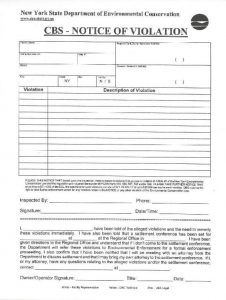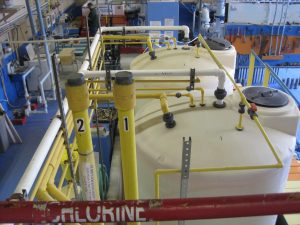Have you received a Notice of Violation from the New York State  Department of Environmental Conservation (NYS DEC) for chemical bulk storage at your business or facility?
Department of Environmental Conservation (NYS DEC) for chemical bulk storage at your business or facility?
Did you know that facility owners can be held accountable for unremedied violations? That means fines, as well as civil and criminal penalties.
One part of chemical bulk storage is an up-to-date Spill Prevention Report. Find our answers to some Spill Prevention Report FAQs.
Do I need a Spill Prevention Report?
The New York State Department of Environmental Conservation (NYSDEC) requires that all owners of Chemical Bulk Storage (CBS) Facilities prepare and maintain a Spill Prevention Report (SPR) a the designated facility in accordance with 6 NYCRR 598.1(k).. The NYSDEC defines CBS Facilities as those “that store a ‘hazardous substance’ listed in 6 NYCRR Part 597 in an aboveground storage tank larger than 185 gallons, any size underground storage tank, with some exceptions, or in a non-stationary tank used to store 1,000 kg (~2,200 lbs) or more for a period of 90 consecutive days or more.”
Who can write a Spill Prevention Report?
For facilities that have two tanks or less and 2,000 gallons or less of total chemical storage, the NYSDEC strongly recommends (but does not require) that a NYS-licensed Professional Engineer (P.E.) prepare the SPR document. However, a P.E. must prepare the document if the facility has
three or more tanks or 3,000 gallons or greater of total storage. Facilities that are considered more of a risk to the environment due to factors such as poor operating histories or sheer volume of hazardous chemical stored will inherently be required to prepare more detailed, complex SPRs.
How often do I need to update my Spill Prevention Report?
The SPR must be reviewed and updated annually, at a minimum. Additionally, the NYSDEC may require an update in the case of a building modification or substantial chemical release.
What’s in a Spill Prevention Report?
Pursuant to 6 NYCRR 598.1(k)(2), the following sections must be included as part of an SPR:
- Copies of facility registration applications and certificates
- Management approval of the SPR (facility owner or authorized representative)
- Detailed facility maps
- Information on the SPR preparer
- Summary of any releases that may have occurred over the past 5 years
- Identification and assessment of potential spills
- Status report on compliance with NYCRR 595-599 (including recordkeeping documents)
- A plan for spill response including:
- Prediction of direction of spill dispersion
- Areas most impacted by spill e.g. sewers, drainage ditches, wells, streams
- Description of equipment/materials used to manage a spill
- Spill reporting procedures
- Emergency contact information
- Plan for annual drills to prepare for an emergency
What else do I need to do, besides prepare a Spill Prevention Report, to keep my chemical bulk storage facility in compliance?
Inspection recordkeeping is a critical piece of an SPR. Monthly, annual, and/or 5-year inspections shall be performed on all CBS facilities. Associated inspection forms shall be included within the SPR and must be made available to the NYSDEC when requested. Any issues or deficiencies observed during inspections must be documented and subsequently remedied. Before placing a deficient system back into service, that system must undergo appropriate functionality and tightness testing to ensure proper performance.
Is my facility ready for a visit from a NYS DEC inspector?
Walden has a team of professionals who can assist you in preparing a Spill Prevention Report for your facility, in addition to the rest of our chemical bulk storage consulting and designing services. Please contact us at (516) 624-7200 to learn more. If you are unsure whether your facility falls under CBS regulations, we would be happy to discuss that with you as well.
Check out our other posts on the chemical and petroleum storage.

